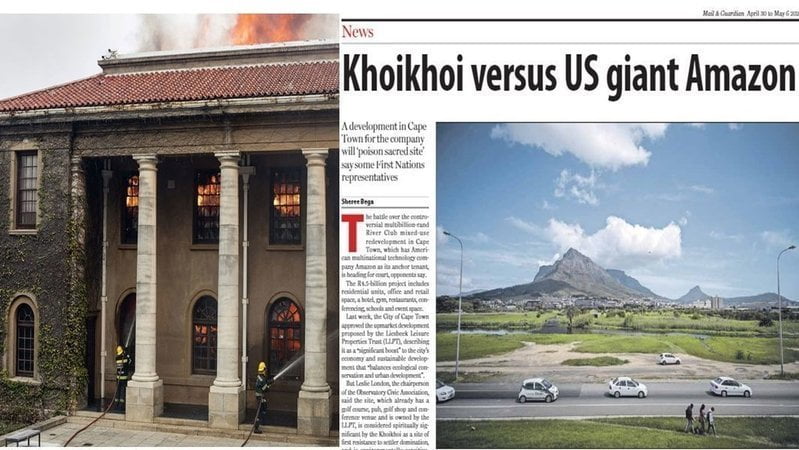2 MAY 2021 —
When the fierce fires swept across Cape Town and devastated irreplaceable texts and materials stored in the Jagger reading room at UCT’s library on Sunday 18th April (see the image above), there was a national and international outpouring of concern at the senseless destruction of our heritage and history. There was a sense of horror at the devastation which affected rare books and resources accumulated in the library over many years. In particular, there was dismay that the rare works destroyed were irreplaceable.
City politicans were quick to join the concern. Mayoral Committee member JP Smith was interviewed by television networks with the burning library in the background. The City’s Mayor Dan Plato noted that “it is tragic that literary treasures have been lost at the UCT library.” Appropriately, one commentator commended the Mayor for his willingness to recognise what is irreplaceable history. She noted the mayor “was there, he was interested, he communicated and he understood what this meant to the City.”
But strangely, at the River Club, the same consideration does not seem to apply. Even though he has been told many, many, many times that digging up the floodplain, obliterating the connection to the mountain with 18 large concrete buildings, infilling the original course of the Liesbeek and destroying forever the Open Space that is the sense of place will irrevocably destroy intangible heritage, the Mayor does not see a problem. He seems to think that it is honouring Khoi history by destroying it and then recreating a cultural centre. Why does he not understand what this destruction will mean for Khoi heritage, for our South African nation, given that the River Club site is of national importance, slated for inclusion in the National Khoisan Liberation trail, precisely because of its intangible heritage value?
Why do we have a City that practices two standards? If UCT loses precious material, of value to the nation, we weep. But if Khoi history, a history of ground zero for all South Africans, is trivialised by replacing the open space of a sacred value with 150 000 square metres of concrete, then we defer to Amazon and its wealth to say it is good for Cape Town. When will the city recognise that all heritage is important, and that you cannot treat a place of deep spiritual meaning as an investment opportunity?
We heard last week that staff at the River Club restaurants and businesses were given a week’s notice as the businesses were closing. We aren’t sure what labour law that complies with but it seems the River Club owners can’t wait to get their construction going even if it means the staff have to face an uncertain future. It’s hard to avoid the sense that this is the kind of labour relations Amazon is bringing to the Liesbeek River – since Amazon has been severely criticised in other context for union bashing and imposing harsh working conditions.
At the end of the day, Amazon will be welcome to set up shop in Cape Town if it complies with labour law and competition rules. But setting up its Headquarters on a sacred floodplain is simply perpetuating the cycle of dispossession and dismemberment of Khoi history. It is, in the words of the Goringhaicona High Commissioner, Tauriq Jenkins, an act which will be “poison to the soul of this space. We say no to concrete on the floodplain, to infill of the river, to the loss of memory to a mall with hotels. We will not bid the kingfisher goodbye.”
The OCA is preparing our legal intervention in this matter. We urge you to support us. Remember our fundraising site where we are collecting funds for our High Court action.


